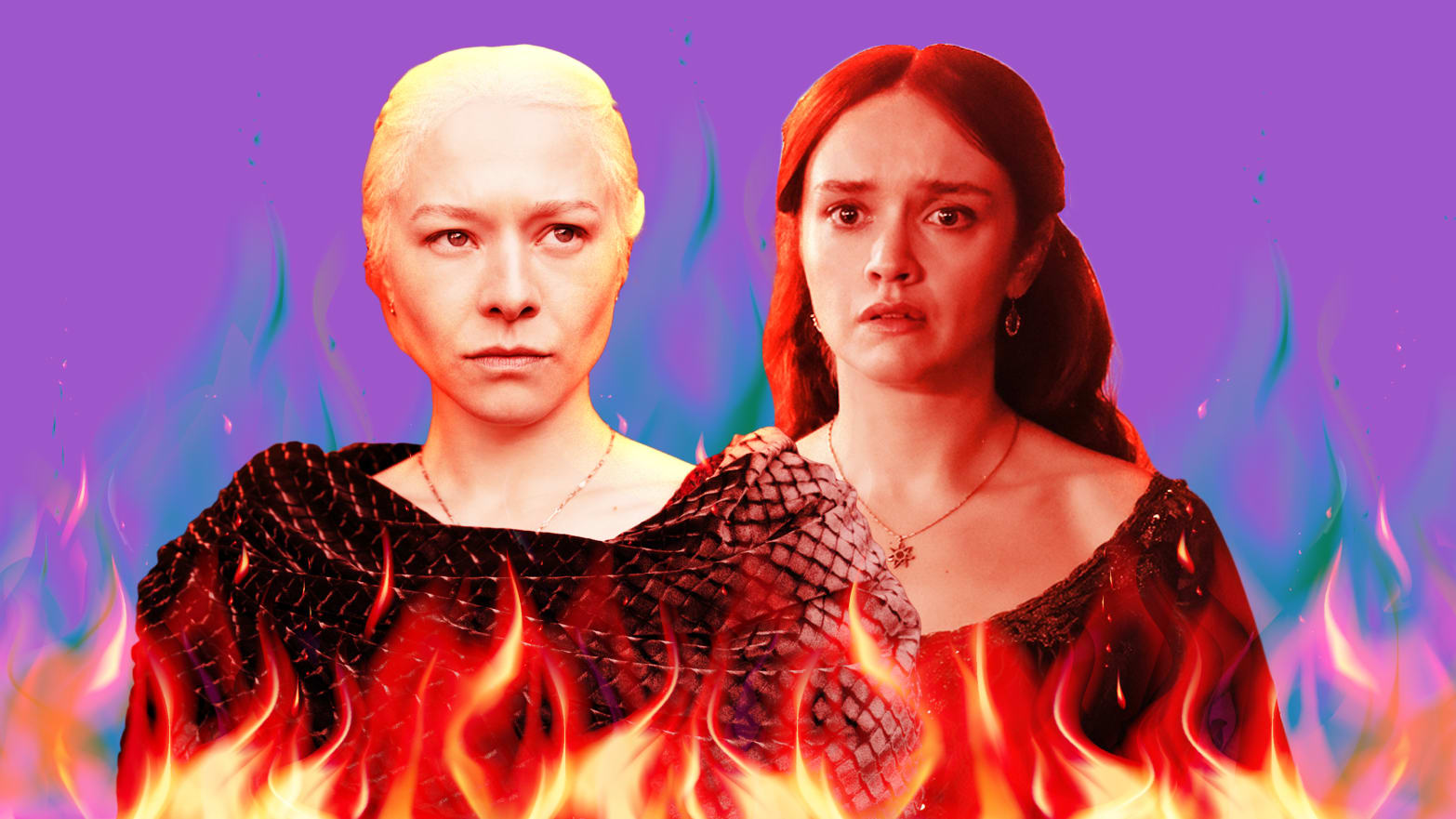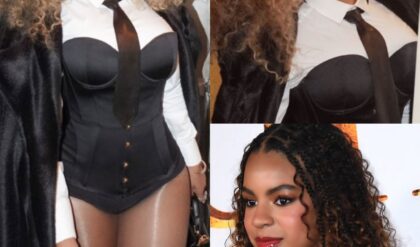The outrageous sexism in “HOTD” doubles as contemporaneous commentary: The men of this world don’t think women can rule, and women should just be OK with that.
Throughout much of House of the Dragon Season 2, Alicent Hightower (Olivia Cooke) and Rhaenyra Targaryen (Emma D’Arcy) have operated as two sides of the same coin. Although they’ve only shared one scene together thus far, both have been thrust to the sidelines in favor of hotter heads, bigger egos, and sheer violence. But in Episode 5, their parallel challenges came to a head as each sovereign faced heated exchanges and pushback, once again showcasing the limits of what the only woman in a room full of men in a world that’s openly hostile toward them can accomplish.
Rhaenyra’s frustration boiled over in what’s now a recurring refrain in her small council meetings. Rhaenys Targaryen (Eve Best) had long been her sole ally against her male advisers, who’d prefer she sequester herself away while the men fight her war. But after “Rook’s Rest,” nothing stands between her and her men’s anger.
Ser Alfred Broome (Jamie Kenna) may be loyal, but he has long been her harshest critic, striking a low blow when bringing up Rhaenyra’s “marital spat” with Daemon (Matt Smith) to highlight her failures. When she questioned his loyalty, he complimented her before pointing out her inexperience.
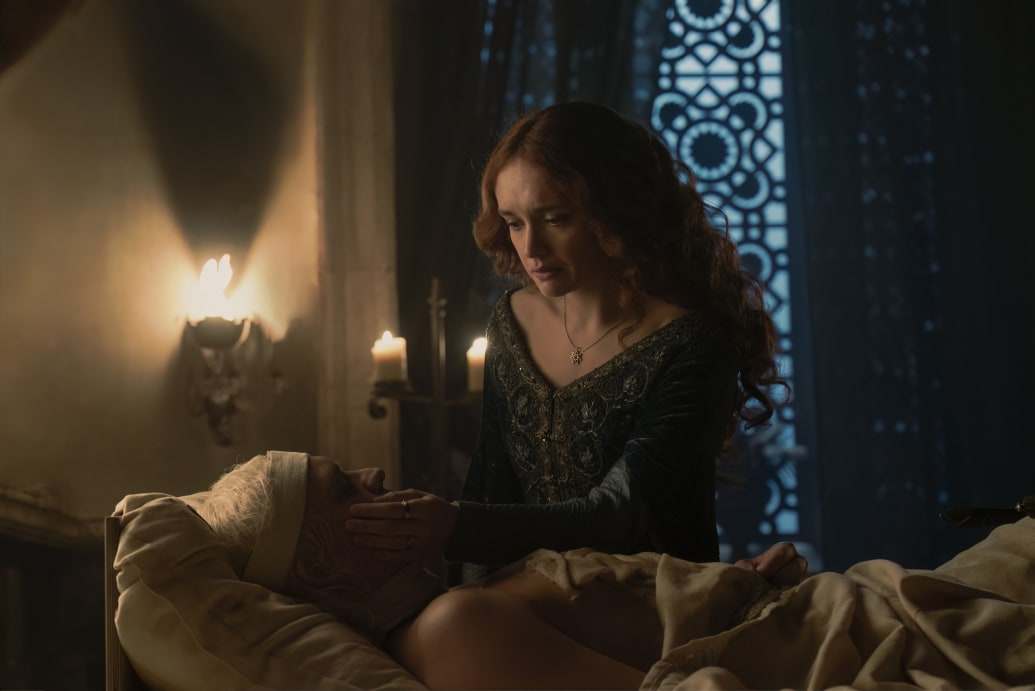
Tom Glynn-Carney and Olivia Cooke
Liam Daniel/HBO
“I could never doubt your capability, or your quickness of mind,” Ser Alfred explained. “It is merely that the gentler sex, heretofore, has not been much privy to the strategies of battle, or their execution.”
It doesn’t matter that Alfred and Rhaenyra have the same amount of battle experience—which is to say none. He tried to be gentle about it, but he had already dismissed her. And she doesn’t know about Daemon’s plan to take King’s Landing and have Rhaenyra rule by his side—but specifically, not serve her as king consort.
Ser Alfred might have some plausible deniability with his words. But the Green Council dropped all pretenses when Alicent had the audacity to suggest she rule as Regent in Aegon’s (Tom Glynn-Carney) place, as he recovers from (or succumbs to) his injuries. She has the diplomatic experience that none of the other small council members have—including Aemond (Ewan Mitchell), Aegon’s direct heir, who Alicent believed lacks the restraint to rule. But she has several strikes against her. She’s not a dragonrider, her experience means nothing in a time of war, and her gender is the final nail in the coffin.
Grand Maester Orwyle (Kurt Egyiawan) backed Alicent up, but when she looked toward would-be allies Larys Strong (Matthew Needham) and Criston Cole (Fabien Frankel), they refused to stand by her. Not only that, they could never actually entertain two women presiding over this civil war, let alone one.
“It must be Prince Aemond,” Larys said. “What would it say if, in response to Rhaenyra’s crowning, we raised up a woman of our own?”
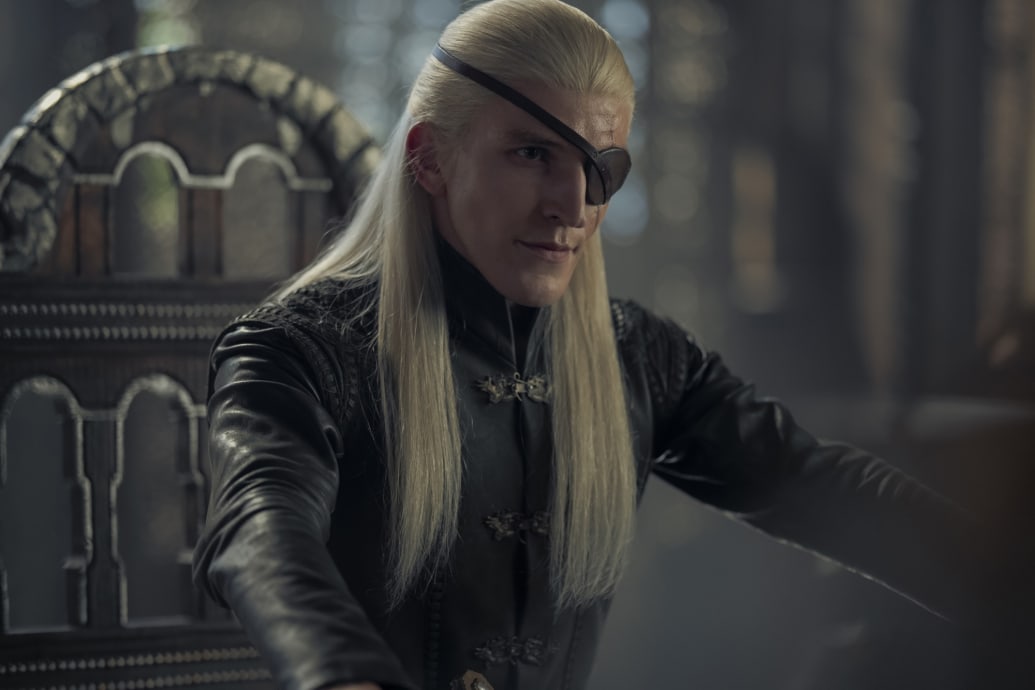
Ewan Mitchell
Ollie Upton/HBO
None of it is subtle, and for House of the Dragon, none of it is new; it’s far from the first time its depictions of outright sexism double as contemporaneous commentary. Those scenes hammer a sentiment—one that is in Fire & Blood but is made more explicit in the show—that much of this world has held onto since the beginning: The men of this world don’t think women can rule (or should rule), and they should just step aside and be content with birthing the next great monarchs until it kills them. (And in this world, it would kill them sooner rather than later.)
For these two queens, the goalposts keep moving. When Rhaenyra had her birthright in her corner, she was chided for her lack of experience, despite most of the council operating at the same level. When Alicent highlighted her experience, she was denied that promotion for her lack of birthright. When all else failed, their gender was blamed. They were both deemed to be too important to risk as their safety was paramount; they were too delicate to face the realities of dragon warfare.
Rhaenys faced his hard truth when the Great Council chose Viserys (Paddy Considine) over her to ascend to the Iron Throne at the beginning of the series. Rhaenys warned a young Rhaenyra (Milly Alcock) that Westeros wouldn’t support her, but she thought that being Viserys’s chosen heir—and that she alone could rule—meant the realm would stand behind her after his death. The Greens forced her hand by usurping the crown for Aegon, but who’s to say that Westeros would’ve kept their word?
Alicent’s push to get Aegon on the throne was part misunderstanding and part self-perseverance. Perhaps, she might’ve thought, if Aegon was on the throne, she could continue offering her council like she did with Viserys and steer him in the right direction. But Aegon increasingly dismissed her council, and when he could no longer rule, her experience meant nothing when choosing who would rule in Aegon’s stead. She sold out her oldest friend and her morals for nothing. To drive the point home, the camera lingered on her for a full minute as her heartbeat rose and the conversation faded.
With limited tools, even their responses to the rampant sexism on their councils can only go so far. Alicent can only lash out at Criston—and remind him of his sins of sleeping with her despite his Kingsguard vows—for stabbing her in the back, and when he dared to presume they were on equal footing, she put him back in his place. But she has no power.
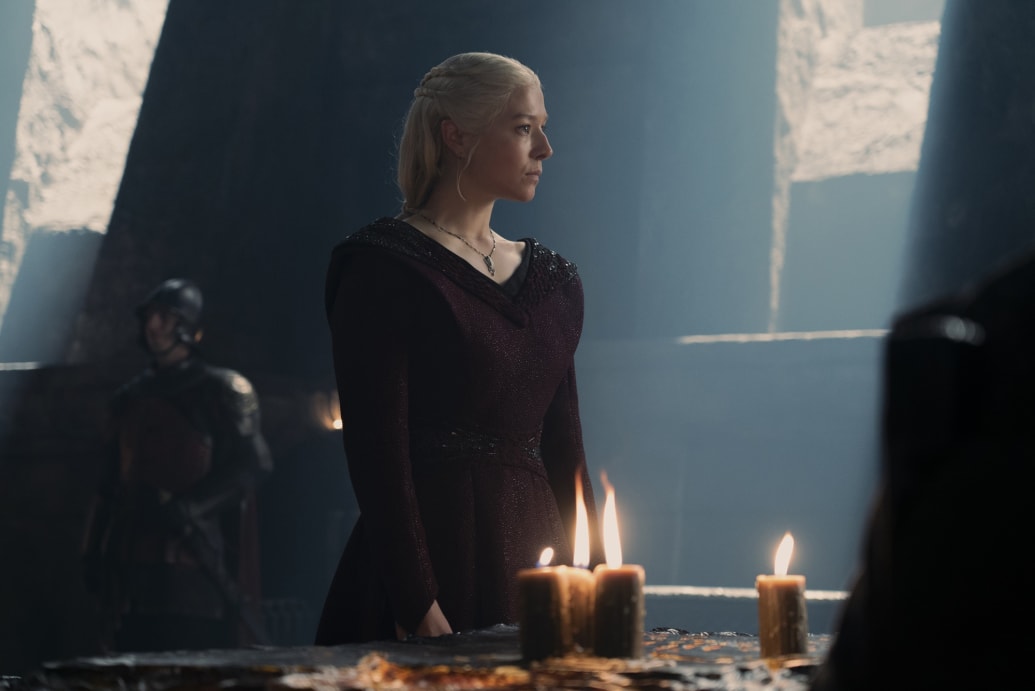
Emma D’Arcy
Liam Daniel/HBO
Rhaenyra has power, but she still has to placate male ego. She had to admit she made mistakes (even if she didn’t believe it) to get Ser Alfred to reason with Daemon. She now has subterfuge to lean on with Mysaria (Sonoya Mizuno) offering to fuel a propaganda war among the smallfolk. Her eldest son, Jacaerys (Harry Collett), got his mother House Frey and suggested looking toward Targaryen bastards to ride their surplus of dragons, while her stepdaughter Baela (Bethany Antonia) flew out to convince her grandfather Corlys (Steve Touissant) to serve as her Hand.
Alicent’s on the backfoot, but Rhaenyra’s latest moves still leave her in a precarious position. Rhaenyra’s standing is only as good as her latest victory: She could find riders for every dragon and win several victories in a row, but her next defeat (no matter the scale of it) will doom her. And we only need to look to Game of Thrones to see the mentality of discarding a woman the second a man shows up is still going strong.
No matter which queen emerges victorious in this war (if one does at all), it’s a tragedy for both of them.
